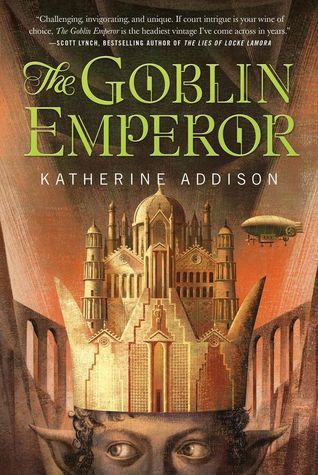Spellbinding and genuinely affecting drama as well as gorgeous prose and intricate world building.

The “grimdark” trend has been weighing down my recent reads. The desire to create realistic characters and situations seems to require endless death, assault, and misery on the part of fantasy authors. It’s not that I want to read something wholly fluffy, necessarily. I often want an intricate political fantasy like Game of Thrones, just one that gives me more hope in humanity than I can get from the Lannisters.
Enter The Goblin Emperor, the 2014 fantasy novel by Katherine Addison. It received the Locus Award for Best Fantasy Novel and was nominated for the Nebula, Hugo, and World Fantasy awards. This book is hopeful and intricate, melancholic and nuanced. It’s the kind of political fantasy I love.
The novel follows Maia, the banished half-goblin son of the elven emperor. When Maia’s father and older brothers all die in a mysterious airship explosion, Maia is catapulted into life as emperor in the gilded court of the capital. Of course, political intrigue ensues.
I will warn you: if you prefer non-stop action, this one isn’t for you. But, as Kirkus Reviews noted, The Goblin Emperor provides “spellbinding and genuinely affecting drama” as well as gorgeous prose and intricate worldbuilding. It is compulsively readable, and the reader’s understanding of the political factions of the court shifts constantly as we learn, alongside Maia, what it means to be emperor of a glittering, hostile nation.
Grief ribbons through the novel. Maia’s grief is a complicated undercurrent, and there are still, quiet moments in which the author masterfully lets us into Maia’s layers of feeling. I was impressed by how real it felt, and how the author managed to subtly show how love, grief, and anger intertwine to pervade Maia’s everyday life. ***add specificity —maybe how his mom influences his decisions? — or, “the author did ___ specifically…”
Usually, when an author writes a good-hearted main character, they will be boringly flawless, naive, annoying, or stupid. Sometimes (the worst times), it’s all four at once. But Maia is none of these things. We understand from the beginning that Maia is intelligent and kind. He didn’t want to be emperor, but his earnest efforts to understand the scope of his new duties endear him to the reader and his people. He is also flawed. His ignorance regarding the workings of the court is as frustrating to him as to the people around him. He is in turn too trusting and not trusting enough, as the pronounced loneliness of being emperor takes its toll. But his choices are never nonsensical or made simply to create narrative drama.
There are people who are selfish, prejudiced, or cruel. The nation Maia has been forced to rule is deeply divided. The setup reminds the reader more of King Lear than The Lord of the Rings. Despite this, there is a sense of hope that permeates The Goblin Emperor. Efforts to make positive changes do not always succeed, but Maia keeps trying. People in his government see his efforts and work with him. In a time in which I often feel helpless in the face of political corruption, war, and other modern catastrophes, The Goblin Emperor is a subtle, gentle reminder that grimdark isn’t everything. Good can be realistic, too.
-Isabella Zentner, Inscape Staff



